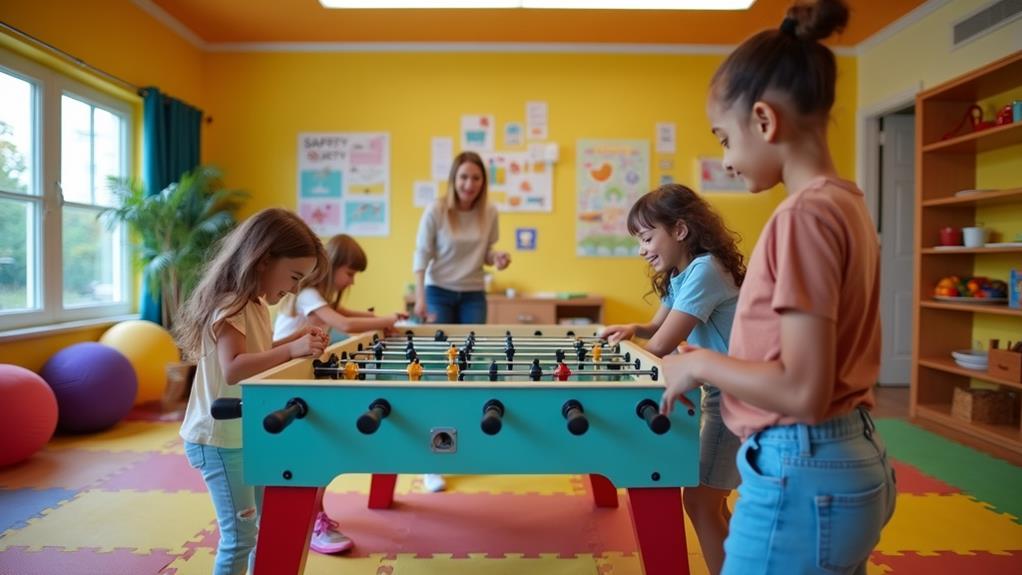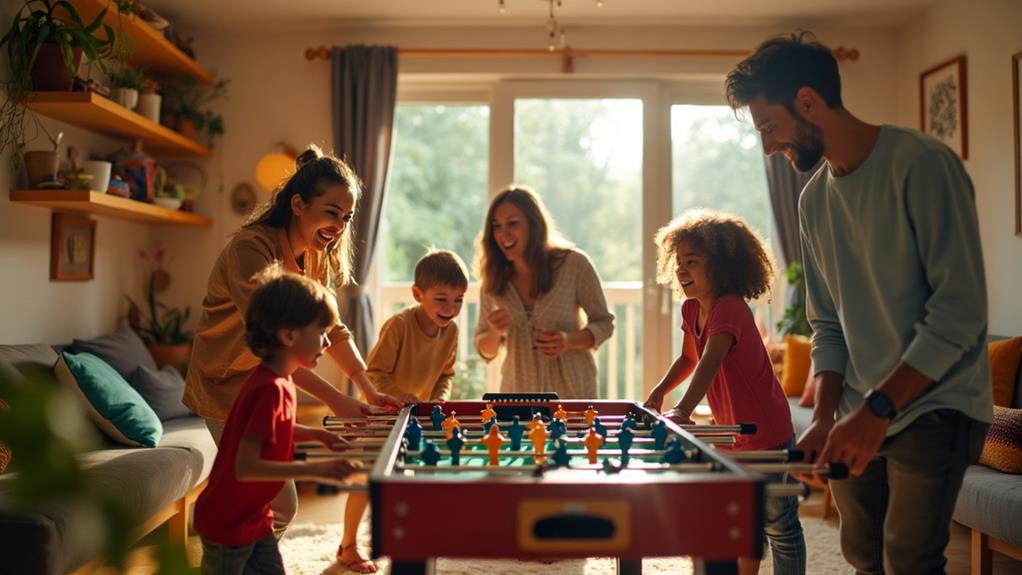At What Age Can Children Start Playing Foosball?

Children can start playing foosball at the age of five. At this stage, they typically have the hand-eye coordination and fine motor skills needed for the game. Foosball helps enhance reflexes, muscle control, and strategic thinking. To guarantee safety and enjoyment, choose tables designed for kids, featuring ergonomic handles, sturdy construction, and rounded edges. Always supervise young players and maintain the table regularly. Setting up a dedicated game area can make it more engaging and fun. If you're curious about how to optimize these benefits and keep your child entertained, there's plenty more to uncover.
Physical and Cognitive Readiness
Around the stage of 5, children are often physically and cognitively ready to start playing foosball. At this time, they typically develop the necessary hand-eye coordination and fine motor skills needed for effective gameplay. These skills enable them to control the rods and strike the ball accurately, a fundamental aspect of foosball. You'll notice that a child's reflexes and large muscle usage improve as they engage more with the game.
Foosball isn't just about physical readiness; it's also a great way to improve a child's cognitive abilities. By learning the basic rules, children start to develop strategic thinking and problem-solving skills. They begin to understand how to position players, anticipate opponents' moves, and make quick decisions, all of which are vital for winning the game.
Moreover, foosball is an excellent tool for social skill development. When children play foosball, they learn about teamwork, cooperation, and sportsmanship. They experience the dynamics of winning and losing, which helps them manage emotions and understand the value of fair play. Playing with peers provides opportunities for communication and collaboration, fostering a sense of camaraderie and mutual respect.
Selecting the Right Table
Choosing the right foosball table for children can make a significant difference in their complete gaming experience and safety. Start by selecting a foosball table that's specifically designed for younger players, typically suitable for children from 5 years and older. These tables are tailored to be suitable for their developmental stage, guaranteeing they can enjoy the game without struggling with oversized or overly complex features.
Look for good quality tables with ergonomic handles and player rods. This makes it easier for small hands to grip and control, enhancing their play experience. A sturdy construction is crucial to withstand the rough play that kids often engage in. You don't want the table wobbling or tipping over mid-game by placing too much force on one side.
Additionally, choose a table with rounded edges and no sharp components to minimize the risk of injury. Safety doesn't end there; adjustable leg levelers are a fantastic feature. They guarantee the table remains stable and level on different surfaces, providing a consistent and fair game for your young players.
Safety Considerations

When considering the safety of children playing foosball, it's essential to guarantee that the gaming environment is secure and hazard-free. For children from 5 years old and up, foosball can be a fun and engaging activity, but ensuring their safety is paramount. Start by setting up the foosball table in a safe play area, away from potential hazards like sharp corners or fragile items that could cause injury if knocked over.
Supervision plays a key role, especially for younger or less experienced players. By keeping a close eye on them, you can help them understand the rules and prevent any accidents from occurring. Furthermore, consider using safety gear such as knee and elbow pads, particularly for younger kids who might be prone to falls or bumps during the excitement of the game.
Always follow the manufacturer's guidelines regarding age recommendations and be mindful of any small parts that could pose a choking hazard. Ensuring that the foosball table is well-maintained and all parts are securely fastened can also help prevent injuries. By taking these precautions, you can create a safe and enjoyable foosball experience for children.
Benefits of Playing Foosball
Playing foosball offers a myriad of benefits that contribute to a child's development in diverse ways. When your child engages in this exciting tabletop game, they're not just having fun but also honing their hand-eye coordination and fine motor skills. These skills are vital for their overall physical development and can be advantageous in other activities as well.
The game of foosball requires strategic thinking and problem-solving. As your child plans their moves and anticipates their opponent's actions, they foster cognitive development. This kind of mental engagement helps build critical thinking skills that are useful in both academic and everyday situations.
Foosball also promotes social interaction and teamwork. When children play this game, they're learning to communicate and cooperate with others. These interactions can strengthen their social skills and teach them the significance of working together towards a common goal.
Additionally, the competitive nature of foosball improves emotional resilience. Your child learns to handle both victories and defeats gracefully, an significant life skill. The fast-paced gameplay further stimulates quick reflexes and reaction times, which can translate to improved performance in other sports. So, foosball is more than just a game—it's a thorough developmental tool.
Tips for Encouraging Play

To encourage children to play foosball, start by introducing it to kids of five years and up. This stage is perfect for fostering hand-eye coordination and social skills through cooperative play. Create an inviting atmosphere by setting up a dedicated Game Room. This space can become a family hub where everyone gathers for fun and bonding.
Organize family game nights that include foosball to promote teamwork and friendly competition among siblings and parents. Keeping the rules simple and the game durations short will help young players stay engaged and avoid frustration. This approach guarantees that everyone enjoys the experience without feeling overwhelmed.
Choose colorful and themed foosball tables to capture children's interest. A visually appealing table soccer setup can spark enthusiasm and make the game more exciting for them. Encourage practice sessions where kids can develop their skills without the pressure of competition. This helps build their confidence and improves their gameplay over time.



